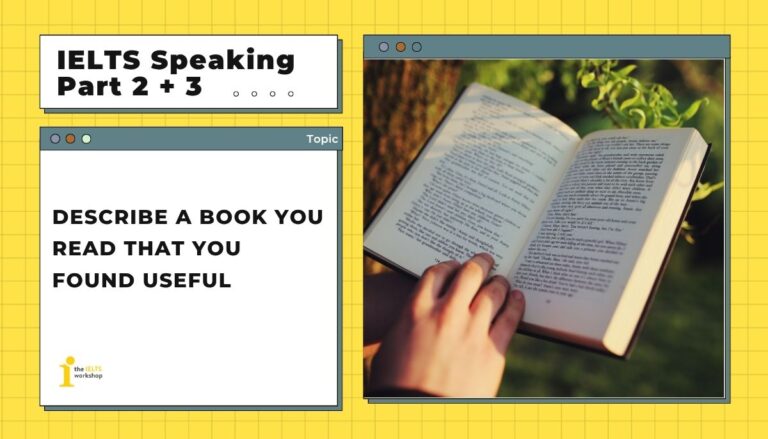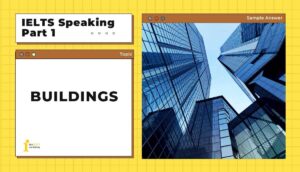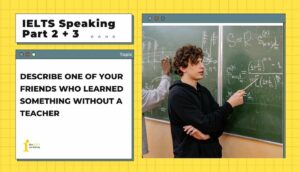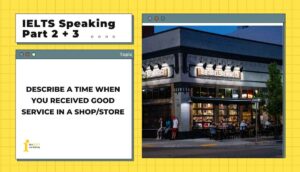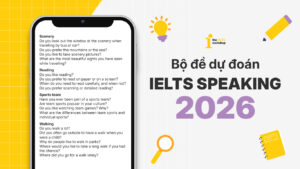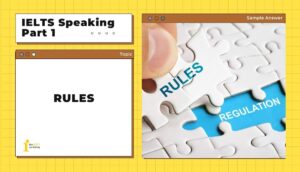Bài mẫu chủ đề “Describe a book you read that you found useful” của cô Nguyễn Kiều Trinh cung cấp ý tưởng mạch lạc, từ vựng đa dạng và chiến lược trả lời hiệu quả cho IELTS Speaking Part 2.
Part 2: Describe a book you read that you found useful
You should say:
- What it is
- When you read it
- Why you think it is useful
- And explain how you felt about it
1. Bài mẫu (Sample)
A book that I found incredibly helpful and practical is The Official Guide to IELTS by Cambridge, which I read about six months ago while preparing for my IELTS exam. It’s a comprehensive guide that covers all four skills – Listening, Reading, Writing, and Speaking – and provides authentic practice tests along with detailed explanations.
I first came across the book when my teacher recommended it in class. At the time, I was struggling with the Writing section and didn’t know what examiners were really looking for. This book helped me understand the marking criteria, and the model answers gave me a clear idea of what a Band 7+ essay actually looks like. What made it especially useful was the Speaking section – it included sample scripts, common topics, and even examiner tips that I could apply immediately during practice.
I used the book almost every day for about two months. I would go through one skill each week, take notes, and track my progress. The tasks were challenging but realistic, which pushed me to improve gradually. It wasn’t just about practice – it also taught me test strategies, like how to manage time, avoid common traps in Reading, or structure a Task 2 essay logically.
Overall, The Official Guide to IELTS gave me a solid foundation and boosted my confidence before the test. It felt like having a personal coach in book form. After using it, I improved my Writing score and felt much more comfortable during the actual exam. Honestly, I think it’s a must-have for anyone serious about getting a good IELTS score.
Sample band 6.5+ by Nguyen Kieu Trinh, IELTS Teacher at The IELTS Workshop
2. Từ vựng (Vocabulary)
- helpful and practical (adj phr): hữu ích và thiết thực
- comprehensive guide (n phr): tài liệu hướng dẫn toàn diện
- cover (v): bao gồm
- authentic practice tests (n phr): đề thi thực tế
- detailed explanations (n phr): giải thích chi tiết
- come across (v phr): tình cờ thấy
- struggle with (v phr): gặp khó khăn với
- marking criteria (n phr): tiêu chí chấm điểm
- model answers (n phr): bài mẫu
- sample scripts (n phr): đoạn hội thoại mẫu (trong phần Speaking)
- examiner tips (n phr): mẹo từ giám khảo
- track my progress (v phr): theo dõi tiến độ học tập của mình
- challenging but realistic (adj phr): mang tính thử thách nhưng thực tế
- test strategies (n phr): chiến lược làm bài thi
- avoid common traps (v phr): tránh những lỗi thường gặp
- solid foundation (n phr): nền tảng vững chắc
- boost my confidence (v phr): tăng sự tự tin
- personal coach (n phr): huấn luyện viên cá nhân (ẩn dụ: người hướng dẫn chi tiết)
- must-have (n): thứ không thể thiếu
Xem thêm: Cách học từ vựng IELTS hiệu quả từ thầy Đặng Trần Tùng 9.0
Part 3:
1. What are the types of books that young people like to read?
Young people often enjoy books that are either entertaining or personally relatable. Many are drawn to fiction, especially fantasy and romance, because it offers an escape from stress and daily routines. Others prefer self-help books that provide practical advice on study habits, mental health, or confidence-building. For instance, a lot of teenagers read novels like Harry Potter for fun or Atomic Habits to improve their productivity. These types of books not only entertain but also support personal growth and emotional development during a crucial stage of life.
- entertaining (adj): mang tính giải trí
- personally relatable (adj phr): có thể đồng cảm, liên hệ cá nhân
- fiction / fantasy / romance (n): truyện hư cấu / kỳ ảo / lãng mạn
- escape from stress (phr): thoát khỏi căng thẳng
- self-help books (n phr): sách phát triển bản thân
- practical advice (n): lời khuyên thiết thực
- study habits (n phr): thói quen học tập
- personal growth (n phr): sự phát triển cá nhân
- emotional development (n phr): phát triển cảm xúc
2. What should the government do to make libraries better?
To improve libraries, the government should focus on modernization and accessibility. This could include upgrading facilities with fast internet, expanding digital collections, and creating comfortable learning spaces. It’s also important to offer free workshops, book clubs, or author talks to attract people of different ages. For example, in countries like Singapore, some libraries provide multimedia rooms and tech classes for youth. These improvements help libraries remain relevant and encourage community engagement.
- modernization (n): hiện đại hóa
- accessibility (n): khả năng tiếp cận
- digital collections (n phr): kho tài liệu kỹ thuật số
- learning spaces (n phr): không gian học tập
- workshops / book clubs / author talks (n phr): hội thảo / câu lạc bộ đọc sách / giao lưu tác giả
- multimedia rooms / tech classes (n phr): phòng đa phương tiện / lớp học công nghệ
- relevant (adj): phù hợp, có giá trị
- community engagement (n phr): sự tham gia của cộng đồng
3. Do you think old people spend more time reading than young people?
Yes, in many cases, older people do spend more time reading than younger generations. One reason is that they often have more free time after retirement and fewer digital distractions like smartphones or social media. Reading can also be a way to stay mentally active and fight loneliness. For example, my grandmother reads newspapers and historical novels every day, while my cousins mostly scroll through TikTok. This habit helps older adults maintain their cognitive health and find a sense of calm routine.
- retirement (n): nghỉ hưu
- digital distractions (n phr): các yếu tố gây xao nhãng kỹ thuật số
- mentally active (adj phr): hoạt động trí tuệ
- fight loneliness (v phr): chống lại sự cô đơn
- cognitive health (n phr): sức khỏe nhận thức
- calm routine (n phr): thói quen bình yên
4. Which one is better, paper books or e-books?
While both paper books and e-books have their advantages, I believe paper books offer a better experience for focused reading. They reduce eye strain and provide a stronger emotional connection. E-books, on the other hand, are extremely convenient, especially when traveling or studying on the go. For example, I use my Kindle when commuting but prefer paper textbooks for exam prep because I can highlight and annotate easily. Having access to both formatsgives readers flexibility, but for deep learning, paper is often preferred.
- paper books / e-books (n phr): sách giấy / sách điện tử
- focused reading (n phr): việc đọc tập trung
- eye strain (n phr): mỏi mắt
- emotional connection (n phr): kết nối cảm xúc
- on the go (phr): trên đường / lúc di chuyển
- highlight / annotate (v): tô đậm / ghi chú
- format (n): định dạng
- deep learning (n phr): học chuyên sâu
5. Have libraries changed a lot with the development of the internet?
Yes, libraries have changed significantly with the growth of the internet and digital technology. They’re no longer just for borrowing books – they now offer e-book lending, online databases, and even virtual learning events. Many libraries also have mobile apps where users can search, reserve, or attend events remotely. For example, my local library lets me borrow audiobooks with just one click. These changes have made libraries more tech-friendly and convenient, but they also need to keep adapting to meet the needs of modern readers.
- digital technology (n phr): công nghệ số
- e-book lending (n phr): dịch vụ cho mượn sách điện tử
- online databases (n phr): cơ sở dữ liệu trực tuyến
- virtual learning events (n phr): sự kiện học tập trực tuyến
- reserve (v): giữ chỗ
- audiobooks (n): sách nói
- tech-friendly (adj): thân thiện với công nghệ
- modern reader (n): người đọc đương đại
6. What should we do to prevent modern libraries from closing down?
To prevent modern libraries from shutting down, we should make them more integrated into community life. Schools can partner with libraries to run reading campaigns or literacy programs, while libraries can host events like book talks, job support, or tech workshops. Some libraries also provide services like CV writing sessions or language classes for immigrants. These additions help libraries evolve into community hubs, offering more than just books. If people see libraries as relevant and valuable, they will continue to support and use them.
- integrated into community life (phr): gắn bó với đời sống cộng đồng
- reading campaigns / literacy programs (n phr): chiến dịch đọc sách / chương trình xóa mù chữ
- CV writing sessions / language classes (n phr): lớp viết CV / lớp học ngôn ngữ
- book talk / job support / tech workshop (n): buổi nói chuyện về sách / hỗ trợ việc làm / hội thảo công nghệ
- community hubs (n phr): trung tâm cộng đồng
- relevant and valuable (adj phr): thiết thực và có giá trị
Xem thêm: 30+ chủ đề từng vựng IELTS thông dụng bạn cần biết
Tạm kết
Hy vọng bài mẫu trên đã giúp bạn hình dung rõ cách triển khai ý tưởng và sử dụng ngôn ngữ phù hợp khi gặp chủ đề Describe a book you read that you found useful trong IELTS Speaking Part 2 & 3. Tham khảo các nguồn tài liệu hữu ích như KHO BÀI MẪU IELTS SPEAKING và Bộ đề dự đoán IELTS Speaking cập nhật mới nhất.
HỌC IELTS MIỄN PHÍ – lớp học độc quyền chỉ có trên website của The IELTS Workshop. Đăng ký để bắt đầu lộ trình học bài bản cùng thầy cô tại TIW ngay nhé!


